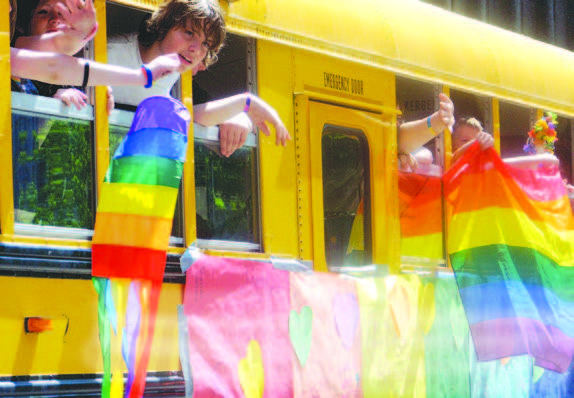 (Editor’s Note: Teacher Lyndsey Schlax of the Ruth Asawa San Francisco School of the Arts recently taught the nation’s first on-site high school LGBT course, according to district officials. She will resume teaching that groundbreaking class next fall. This semester, she is teaching a new Ethnic Studies course. It is a popular elective among the school’s Social Science offerings. In this column, students from her class will be anonymously sharing with the San Francisco Bay Times their thoughts about related matters, and what they are learning.)
(Editor’s Note: Teacher Lyndsey Schlax of the Ruth Asawa San Francisco School of the Arts recently taught the nation’s first on-site high school LGBT course, according to district officials. She will resume teaching that groundbreaking class next fall. This semester, she is teaching a new Ethnic Studies course. It is a popular elective among the school’s Social Science offerings. In this column, students from her class will be anonymously sharing with the San Francisco Bay Times their thoughts about related matters, and what they are learning.)
Juliana
Student, 12th Grade
People’s names have a lot to do with their families, their cultural backgrounds, and their parents’ hopes for what their child will become. This idea became clear to me after our class watched the movie The Namesake. I began to dig into what my name means to me.
I am Juliana, but not Giulianna because my dad didn’t really care to maintain the cultural accuracy of the traditional Italian name. I am Juliana, but not pronounced the Spanish way because I am not Latina, although my name suggests to a lot of people that I am.
I am Juliana with one “n” because my parents are simplistic, straight and to the point. As they would say: Why use an extra letter where you don’t need it? I am Juliana, like the queen from the movie The Quest for Camelot, which my sister named me after. She suggested “Kylie” at first, and I’m glad my parents didn’t go along with that one.
I am Juliana with one middle name and one last name, because my mom didn’t give me her maiden name like so many Filipino members of her family had done before her. She has five names, and I only have three. I am Juliana, and sometimes Julie, but you can only call me that if we’re close, because otherwise “Julie” makes me feel like a white lady soccer mom with a blonde bob.
I am Judy to my dad, who is always one to butcher names for the fun of it. Because I “look like a Judy,” according to him. I am Juliana, as I proudly, rhythmically spelled out loud when I was six years old: “J-u-l-i-a-n-a,” with my voice growing louder as I approached the final letters. I am Juliana, commonly mistaken for Julia because, as opposed to six-year-old Juliana, I am quieter now and I guess my voice dies out when I say the last syllable.
I am Juliana, pronounced “Julionna” to some, and “Julianna” to others. Whichever you prefer, I don’t mind. I am Juliana.
Immigration Education
Student, 11th Grade
Recently in my Ethnic Studies class, we were discussing immigration. We looked at common myths associated with immigration and the immigration system. This activity made it abundantly clear that we as a society have a lot of teaching to do about how the immigration system works.
I’m only a junior in high school and I haven’t taken any government classes yet. Many of my peers and I, however, feel that there has been a gaping hole in education surrounding this system that is so prevalent in all of our lives, especially here in California. As being faced in a few short months as being a functioning adult member of society, I am much more motivated to do my own research and gain my own knowledge about immigration because I have learned that I really don’t know too much.
Recent Comments